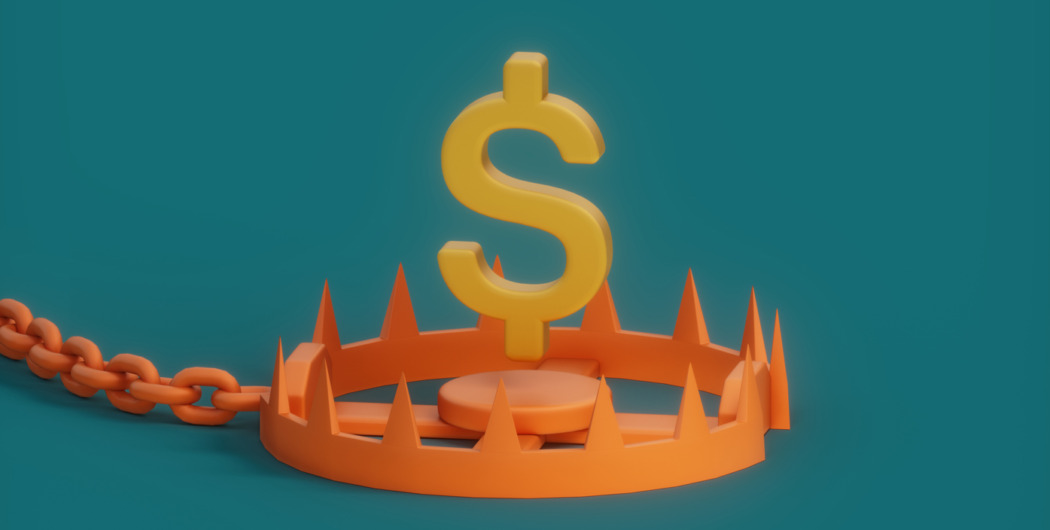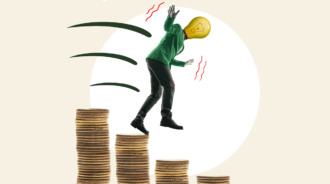

It took Alfred North Whitehead and Bertrand Russell 300 pages to prove 1+1=2. Even though it might not seem so, formally proving 1+1=2 from the first principles is not an easy matter. So, basic mathematics is surprisingly complex.
Why is day trading so hard—most traders would like to know the answer. This article will explore five biases that are part of this answer. At the end, you’ll also get a few recommendations on how to avoid these and other common mistakes.
1. Familiarity bias
One reason why trading is hard is familiarity or “home bias.” Basically, many traders tend to overestimate their knowledge about a certain topic and underestimate the need to do research.
You may think that you know enough about a certain company and its stock, which automatically gives you relevant expertise. But this is a trap. You may end up with an overconcentrated portfolio (one company, one sector, one country) or make a bad investment decision because you didn’t bother looking into it.
2. Extrapolation bias
Extrapolation bias means taking existing trends and making an estimation for the future based on them alone. In other words, predicting the future through a few known facts.
Humans often believe that many events are bound to repeat themselves. This assumption can sometimes be true, but past performance shouldn’t be the only indicator for future performance. Markets go up and down, moving in cycles with different levels of intensity and duration.
If you bought at the wrong time based on a “good feeling,” for example, right before the burst of the Dotcom bubble in 1999, you would have to wait 11 years to recover your losses.
3. Anchoring trap
The anchoring trap occurs when people are too confident and rely too heavily on what they originally thought. For example, let’s say your perception of a stock was positive, and it turned out to be wrong. But because of anchoring bias, you may feel so invested—or “anchored”—in your original analysis that you refuse to back out of your position.
Once again, this way of thinking is useful in moderation. But financial markets can be famously unpredictable, so you must be willing to be flexible and admit when your preconceptions are wrong.

4. Confirmation trap
When people draw a conclusion first and then seek out others who think the same, they are in the confirmation trap. The Internet is so vast that you’ll almost definitely find people whose views are consistent with what you already believe. This makes the trap so easy to fall into.
For example, let’s say you’ve opened a big position on a stock. If experts, analyses, and commentaries somehow differ from your thesis, you’ll discredit, filter, or simply overlook them. To avoid this trap, you need to look at different opinions and reconsider your decisions in light of new information.
5. Loss aversion
As the name suggests, this trap describes the tendency to go to great lengths to avoid a loss. Sometimes, it becomes even more important than getting returns. For example, some traders and investors will try harder to avoid losing $100 than they’ll to gain $100. As a result, it leads to panic selling during major sell-offs. They quickly turn their unrealized losses into real ones, often at the worst possible times.
If your portfolio is down, wait until you can take a calmer, more objective look. You may still end up selling, but at least it will be a rational decision.
How to avoid sabotaging your own success
If you still keep asking yourself “why is trading so hard,” you may have become the obstacle to your own success. It may be the case that your behaviors and thoughts are what make you sit on the sidelines. Try the following tips:
Newbie stage
You are a new trader at this point, full of hopes and dreams of success. You have no idea where to start, and you don’t even know what you plan on trading in the first place. You just heard that numerous traders had great success and you want to give it a go. That being said, you are also concerned because you heard of people being scammed in their trading attempts.
The first thing you need to do in the newbie stake is to take a deep breath and keep calm. Day trading requires some basic knowledge at first, but you don’t need to be an expert. You just need a good strategy and not trade more than you can afford to.
Put education first
As a trader, you will feel tempted to throw yourself out there and make a big win. You’re obviously in it for the money, and since you are dedicating your own time, you accept nothing but success. But while you don’t have to be an expert, you do need a certain degree of education.
A successful trader is one that respects the entire process. Education is an important step in that process. Research as much as you can and learn from professionals about the art of trading. There are various courses and articles you can get your information from. When in doubt, Google also knows the answer. Once you’ve done your research, you may use a trading simulator to learn more about strategizing.
Ignore insignificant information
Many newbie traders fall into the trap of relying too much on their trading tools. They look for the best platform, best broker, best computer, best scanners, and so on. While those tools can be helpful, they are rather insignificant compared to other aspects of trading.
The most important thing you will need to focus on is your skillset. Regardless of the broker or computer that you use, it’s just as easy to lose money. This often happens when you are not careful about the market or the trades that you make. This is why you need to hone your skills first, and then look for the fancy tools.
Expand your trading network
As a trader, you might think that you are doing solo investment work, but you are wrong. Your success often comes from having the right resources. You can do your research from articles, indeed, but it’s much better to learn from actual people in the field. The right connections can also bring the right opportunities.
Your trading network should have your team, your role models, and several trading buddies. Create a network with people who have already been where you are right now. All of them are usually willing to help, but you’re the one that will have to reach out to them. You’ll see how easy it is to create opportunities after that.
Don’t compare yourself to others
Having role models and people that can help you is an essential part of being a trader, but it can also cause you to fall into another trap: the comparison one. Regardless of your trading level, you should never compare yourself to other traders.
If you do, you will never be happy. You can make $1 million per year in trading, but it will never be good enough. There’s someone else out there that makes $10 million, which makes you unhappy. If you are making money, be happy with your success, and don’t drag yourself down with what other people are doing.
Remember – you are not Superman
No matter how good you are at trading, you can always end up losing money – and sometimes, those amounts are not too small. You may feel tempted to double your efforts and make up for your earnings. And you may succeed, only to lose all of those earnings on a bad trading day. It happens.
What you need to remember is that you are not Superman. Nothing is ever perfect, and you will have bad moments just like everyone else. You must accept that these losses are temporary, and you will eventually bounce back. Don’t beat yourself simply because you entered a rut and got stuck in it.
Also,
- Recognize self-sabotaging habits. What causes and reinforces your negative behaviors? Try to look at your trading decisions from an outsider’s perspective.
- Make small, meaningful changes. Avoid trying to make grand, sweeping changes all at once. Start small to create larger transformations over time?
- Keep an open mind. Don’t be afraid to find yourself in situations when the market proves you wrong. When you let go of the desire to always be right, it’ll get easier to focus on what’s happening and adjust accordingly.
On the final note, feeling that trading isn’t easy is normal— because it’s true. But the journey should get more rewarding and smooth as you become more skilled and experienced. Make sure to keep your conscious and subconscious patterns of behavior in check, perhaps you’ll find yourself in some of these psychological traps.










